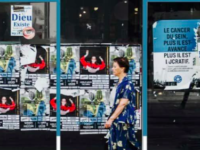L’atelier Città ha organizzato il panel Gender-based violence and urban spaces. From security to self-determination presso la “Gender Studies 2019 – conference on violence“, incontro internazionale che si terrà ad Helsinki dal 24 al 26 ottobre 2019.
Qui di seguito troverete la descrizione del nostro workshop, assieme alla descrizione e agli abstract della sessione.
Gender-based violence and urban spaces. From security to self-determination
Chairs: Federica Castelli, Chiara Belingardi and Serena Olcuire
Discussant: Marianne Blidon
In the latest years feminist movements from all over the world have gathered in a shared struggle against violence against women, speaking out against patriarchal system precluding womens freedom and self-determination. Women have gathered in a huge wave of protests: sharing experiences, practices and reflections, and acting together. Violence has been identified in each factor that hampers freedom in women lives: patriarchal violence is not just physical, but structural, and today it is more pervasive than ever – due to neoliberal policies, austerity, precarity, and borders proliferation. This struggle against men violence against women lead us toward the urgency of a rethinking of forms of structural violence arising from urban space, and open up a collective debate between activists and scholars from different academic disciplines. The victimizing idea that confines women to play the only role of possible objects of violence, securitarian discourses and policies, populist rhetorics on urban decay and urban decency, dynamics of fragmentation and privatization marking neoliberal cities: all these factors produce expulsion from public space and confinement in the domestic, private, space. But cities are not, fortunately, a fait accompli: they are the result of different practices and uses of those who live it, re-shaping it according to their desires, re-inventing it with everyday actions; the city can be also a dispositif of re-appropriation, legitimization, and freedom. The workshop aim to to pinpoint and criticize the securitarian approaches to cities, that make the link among women, violence and cities, a victimizing and subjectivating paradigm, which is both oppressive and normative. We expect papers rooted in a critical approaches to urban policies, and focused on women self-determined practices in new, shared visions of the city.
Abstract degli interventi
Name: Giada Bonu
University/institution: Scuola Normale Superiore
Title of Abstract: Maps of Desires Building Feminist Safer Spaces Facing Urban Inequalities
Abstract: My aim is to analyze feminist production of safer spaces, both as physical and emotional spaces, as a practice which face inequalities and dispossession in urban areas through empowerment and agency. As a comprehensive approach, I’m using Participatory Action Research through feminist method and constructivist grounded theory, challenging traditional processes of knowledge production. I’ll present a pilot study throughout the first in-depth interviews to feminist activists and results from the first ethnographic period in the first case, the International Women’s House in Rome.
Public space, as marked masculine, white, able and heterosexual space, excluded women, queer, crips and several other “misfits”. Painstakingly overcoming the heteronormativity of public space, queer and feminist communities have step by step gained the right to inhabit the city, experimenting re-appropriation, legitimization and freedom. More than room of one’s own (Woolf 1929), these spaces are kitchen tables (Hull, Scott and Smith 1982; hooks 1991), beyond the traditional dichotomy of private and public space, which allow queer and feminist communities to try out a new sense of safety, strength, bravery, against the feelings of danger, loneliness, insecurity daily experienced in the city (Hubbard 2001; Hanhardt 2013). Contrary to securitarian discourses and rhetoric on individual protection, feminist spaces are able to produce a safety of community, based on sisterhood, care and solidarity. Imaging, producing and preserving a space for “us”, for bodies traditionally read as “other”, outside and against violence, means creating new narratives and imaginary, new networks of care, affection and solidarity.
Name: Lorna O’Hara
University/institute: Maynooth University, Co. Kildare, Ireland.
Title of Abstract: Making street harassment visible: digital storytelling and creative practice in
Abstract: Geographers have examined how violence and fear of violence disproportionately limits women’s control of, access to, and mobility within the city (Valentine 1989; Pain 1991; Koskela and Pain 2009). However, women also interact with public space to resist and overcome those very fears (Koskela 2005). These acts of resistance often form the basis of much contemporary feminist activism (Whitson 2018).
While statistics on street harassment are only beginning to come to light through recent collaborative studies (see Hollaback! & Livingston 2015), the bottom-up efforts of anti-street harassment activists and artists that have been successfully creating dialogue about this particular type of gender-based harassment. Feminist activists, such as those belonging to international anti-street harassment network Hollaback!, use digital storytelling as both a form of feminist pedagogy (Wångren 2016) and as a type of informal justice system (Fileborn 2014). However, the impact these digital practices on our understandings of public urban space and embodiment remain under-researched; in particular, how does their use of virtual space intersect with the material space of the city? In this paper, I examine how Hollaback! Berlin, combined digital storytelling tactics and local creative-place based actions to merge internet spaces with the built environment; creating empowering hybrid urban spaces, whereby on- and offline practices coalesce to confront normative gendered understandings and relationships to the city (Frith 2012). The digital, embodied and local nature of contemporary feminist activists opens up their actions, transforming their political potential and creating new opportunities for solidarity, participatory politics and even artistic practice.
Name: Serena Olcuire
University/Institute: Università La Sapienza
Title of Abstract: Sex work and the governance of public space in Italy. How to exclude “excessive” bodies and behaviours from urban life
Abstract: The paper proposes some reflections on the government of street sex work in Italy, framing it in the securitarian approaches to urban governance. Italy does not consider prostitution itself to be a crime, but via spatial government it thinks up escamotages to contain and control its visible features. These attempts can be ascribed to the set of measures referring to the chimeric concept of decorum, pursuing an idea of the city where both diversity and marginality are not seen. A first interpretation concerns the new approach to the public space which is being imposed throughout the country is based on what we may call “right to security without security of rights”. The removal of sex workers to the outskirts of the city is legitimated by security reasons, but it is not supported by the guaranty of fundamental rights to those who are removed. This factor has a strong impact on many categories of inhabitants, fostering dynamics of impoverishment and precariousness. The second interpretation is linked to the sphere of the uncanny: in street sex work, the transgression of gendered and sexualized bodies in the public space becomes explicit, and their “excessive” visibility is confined to the outside of the purified spaces of residency and consumption. Queer and gender studies turn out to be interesting interpretation filters of a phenomenon that draws a moral geography: a geography that seems to reflect, once again, patriarchal and heteronormative features, and to deny the right to the city to certain categories of inhabitants.
Name: Olivia Domínguez Prieto
University/institute: Escuela Nacional de Antropología e Historia/INAH
Title of Abstract: Public space and gender violence in Mexico City
Abstract: Gender violence in Mexico has reached unimaginable limits. In recent years, the United Nations warns that in Mexico, at least 6 out of 10 Mexican women have faced an incident of violence. 41.3% of women have been victims of sexual violence and, in its most extreme form, nine women are murdered daily. That situation happens in a framework of constant impunity, that beyond punishing the guilty, builds speeches that blame the victims, despite the insistence of the organizations to establish a gender alert. Mexico City, the capital of the country, with more than twenty million inhabitants, is not exempt from gender violence, in the streets, transportation and public space, women are constantly victims of violence. This work shows a diagnosis of gender violence in the public space, as well as the proposals that different organizations of civil society have put in place so that women can travel through and live in safe spaces.
Name: Maria Jose Sepulveda Paez
University/institute: Universidad de Chile
Title: Cartographies of Fear – The Experience of Women in Public Spaces
Abstract: Despite women being half the population, and inhabiting public spaces even more frequently than men, public space design doesnt consider them nor their needs when defining itself, invisibilizing them under the veil of the universal subject commonly used in architecture. As a result of this bias, women are left exposed to violences where the space acts as a frame, and even as a propitiator element. In the face of the threat of violence, fear arises as an answer in the shape of imaginaries, which added to the responsibilization of the victims that we exercise as society before a situation of violence, inhibits or limits the participation of women in urban life (this is evidenced through the strategies that women use daily to navigate public space, under the premise that certain appropriate conducts will keep them safe). Therefore, questioning in which way architectural design contributes to the creation of fear in women, and how we can change that becomes relevant. Through an exploratory work originated as an academic exercise, a bibliographic revision is developed, focusing on the experience of women in space as well as its production. Based on this revision, information about a neighborhood in Santiago, Chile, is gathered through collective mapping tools, alongside semi-structured interviews and focus group, determining in which way spaces play a role in the creation of fear in women, which are the characteristics of these spaces, and how they affect their living in the city.




